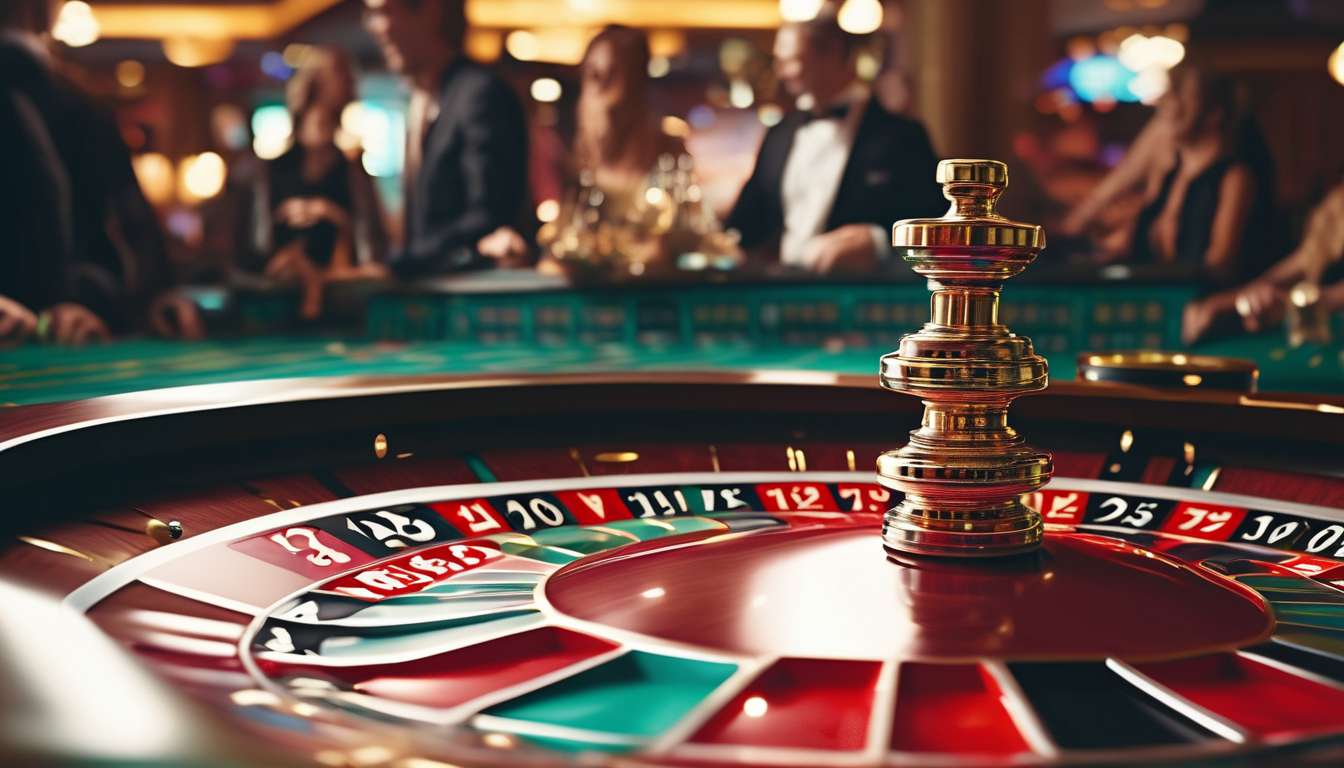In the world of casino gaming, roulette stands out as a timeless favorite, captivating players with its blend of chance and strategy. Enthusiasts and analysts are fascinated by the patterns and behaviors that emerge at the roulette table.
Our journey into understanding these betting patterns is not just about numbers spinning on a wheel, but about the collective psyche of players who hope to outwit the odds. We delve into the intricate dance of risk-taking and reward-seeking that defines roulette betting, exploring how players:
- Adapt strategies
- Chase streaks
- Rely on intuition
By examining these behaviors, we aim to uncover the underlying motivations and psychological factors driving decisions. This exploration is designed to not only satisfy our curiosity but to provide insights that could potentially:
- Enhance the gaming experience for players
- Inform casino strategies
Join us as we unravel the complexities of roulette betting patterns, embarking on this exploration together.
Betting Pattern Evolution
Over the years, we’ve observed how roulette betting patterns have transformed with changing strategies and technologies. As a community of enthusiasts, we’ve seen how our collective approach to the game has evolved.
Betting strategies have become more sophisticated, with many of us employing systems like:
- The Martingale
- Fibonacci
These strategies are used to try to tilt the odds in our favor. They offer us a sense of control and camaraderie, even though the game’s inherent randomness remains unchanged.
However, it’s crucial to recognize how cognitive biases and emotional decision-making can influence our betting choices. We’ve all experienced the pull of the gambler’s fallacy, convincing ourselves that a red or black streak is bound to end.
Our emotions can cloud our judgment, leading us to make bets driven by hope rather than logic. By understanding these biases, we strengthen our bond and improve our strategies, fostering a more informed and united community in our shared pursuit of roulette mastery.
Risk Management Strategies
Effective Risk Management in Roulette
In our quest to master roulette, we’ve realized the importance of adopting effective risk management strategies to protect our bankroll and maximize our chances of success. By understanding and implementing these strategies, we not only enhance our gameplay but also foster a sense of community among fellow enthusiasts who share similar goals.
Avoiding Cognitive Biases
When exploring betting strategies, it’s crucial to remain vigilant against cognitive biases that may cloud our judgment. These biases often lead us to perceive patterns where none exist, causing us to make irrational choices. By recognizing these pitfalls, we can make more informed decisions and avoid the trap of emotional decision making.
Setting Predetermined Limits
To maintain control over our bets, we set predetermined limits on both wins and losses. This disciplined approach ensures that we don’t chase losses or become overconfident after a few wins.
- This involves:
- Setting a win limit to know when to walk away with profits.
- Establishing a loss limit to prevent excessive losses.
Community and Smart Play
Remember, we’re not just playing a game; we’re part of a community that values smart play and mutual support. By managing our risks effectively, we enhance our collective roulette experience.
Impact of Past Outcomes
Understanding the Influence of Past Outcomes on Betting Decisions
Our understanding of how past outcomes affect our betting decisions is crucial in refining our overall roulette strategy. We often find ourselves swayed by previous spins, whether consciously or unconsciously.
Patterns and Cognitive Biases
Patterns emerge not only from the wheel but also from our reactions to its results. These reactions shape our betting strategies, often rooted in cognitive biases. For example, the gambler’s fallacy might lead us to believe a number is "due" after a series of misses, influencing our decisions emotionally rather than logically.
Emotional Decision Making
When we place bets, our emotional decision-making is at play. Our community of players shares this common experience, where past outcomes seep into our strategies, connecting us all in this intricate dance of probability and psychology.
Striving for Informed Choices
By recognizing these influences, we can strive to make more informed choices. Together, we can navigate the complexities of roulette with a sharper awareness of how past results shape our future bets. This awareness strengthens our sense of belonging in the roulette community.
Influence of Surrounding Environment
Our betting decisions are often shaped by the surrounding environment, where the energy and atmosphere of the casino can subtly influence our choices.
As we gather around the roulette table, the buzz of excitement and anticipation can lead us to adopt certain betting strategies. We might find ourselves influenced by cognitive biases, such as the bandwagon effect, where seeing others bet on a number encourages us to do the same.
The vibrant sounds and lights heighten our senses, drawing us into a shared experience with fellow players. In these moments, our sense of belonging becomes intertwined with our decision-making process. We’re not just individuals placing bets; we’re part of a collective energy that fuels our actions and choices.
While we aim for rationality, the environment nudges us towards emotional decision making. The camaraderie and shared excitement can lead us to make choices that align with the group, sometimes at the expense of our usual strategies.
Emotional Decision Making
Our emotions often take the driver’s seat when we’re caught up in the thrill of betting, leading us to make impulsive decisions that we might not otherwise consider.
In the world of roulette, where chance reigns supreme, emotional decision-making can significantly influence our betting strategies. We might find ourselves:
- Doubling down on a number that just feels right
- Chasing losses, driven by the hope of an impending win
These choices are often fueled by cognitive biases, like the gambler’s fallacy, where we believe past events influence future outcomes.
As a community of players, we share these experiences, understanding the emotional highs and lows that accompany each spin. It’s this shared journey that connects us as we navigate the casino floor, each of us trying to balance the thrill with strategy.
By acknowledging the role of emotions, we can strive for more mindful betting, recognizing when our hearts sway our hands and when to recalibrate our approach.
Social Interaction Dynamics
At the roulette table, we form fleeting alliances and rivalries, creating a unique social dynamic that enhances the overall experience. As players, we find camaraderie in shared victories and the collective tension of a spinning wheel. These interactions influence our betting strategies, as we learn from each other’s successes and failures. We often cheer for our fellow players, forming a bond that goes beyond the chips in front of us.
Our cognitive biases and emotional decision-making come into play, as the thrill of the game often leads us to mimic the betting patterns of those around us. We might adopt a strategy we’ve observed, convinced by the excitement and confidence it generates in others.
This social influence can sometimes steer us away from rational decisions, but it also fosters a sense of belonging. Together, we ride the highs and lows, creating an atmosphere where every spin feels like a shared journey, connecting us through the unpredictability of chance.
Role of Cognitive Biases
Our decisions at the roulette table are often swayed by cognitive biases that distort our perception of probability and risk. As a community of roulette enthusiasts, we share a common experience in navigating these biases.
The Gambler’s Fallacy leads us to believe that past outcomes affect future spins. For example, we might think, "Red has hit five times in a row, so black is due," even though each spin is independent. This cognitive bias influences our betting strategies, often leading us to make decisions driven by emotion rather than logic.
Emotional decision making also plays a significant role. When we’re on a losing streak, the Sunk Cost Fallacy might push us to keep betting more, believing we need to recoup losses. These biases make us feel connected, as we’ve all faced similar situations.
By recognizing these patterns, we can:
- Develop more effective betting strategies.
- Support each other in making informed choices at the roulette table.
Understanding these biases allows us to make decisions based on logic rather than emotion, ultimately improving our experience as a community.
Future Trends in Player Behavior
As technology advances and data analytics become more accessible, we foresee a shift towards more data-driven decision-making among roulette players. Together, we can harness these tools to refine our betting strategies, moving away from purely instinctual play.
In this new era, cognitive biases will still influence us, but we’ll be more equipped to identify and mitigate them. By recognizing our tendencies, like the gambler’s fallacy or overconfidence, we can make more informed choices that strengthen our community of players.
We’ll also see emotional decision-making evolve. While emotions will always play a role in how we place bets, the integration of data allows us to balance intuition with logic. This balance will create a more cohesive experience that supports our shared love for the game.
As we embrace these changes, we foster an environment where learning and growth are valued, enhancing our collective enjoyment and success at the roulette table.
Let’s move forward, together, into this exciting future.
How do online roulette platforms track and analyze player behavior?
We use sophisticated algorithms to track and analyze player behavior on online roulette platforms.
By monitoring:
- Betting patterns
- Win rates
- Session durations
we can gain valuable insights into player preferences and strategies.
This data helps us improve the gaming experience by:
- Offering personalized recommendations
- Creating a more engaging environment for our users
Our goal is to enhance player satisfaction and foster a sense of community within our platform.
What are the most common superstitions among roulette players?
Superstitions Among Roulette Players
We’ve noticed that among roulette players, superstitions are quite common. Many players have personal beliefs and practices that they think influence the outcome of the game.
Common Superstitions Include:
- Believing in lucky numbers or colors
- Using lucky charms
- Avoiding certain seats at the table
- Performing specific rituals before placing bets
These superstitions can vary widely from player to player, but they all add an element of excitement and personal belief to the game.
Unique and Engaging Experience
These little quirks make the roulette experience unique and more engaging for us all. Each player’s individual superstitions contribute to the overall atmosphere and enjoyment of the game.
How does the time of day affect the betting behavior of roulette players?
During different times of day, our betting behavior in roulette can vary significantly.
Mornings might bring cautious wagers, often marked by more conservative and calculated bets as players are more alert and reserved.
In contrast, evenings could lead to riskier bets, influenced by the relaxed atmosphere and perhaps the effects of social interactions or fatigue.
As a group, we tend to react to the energy of the moment, which can significantly influence our choices at the table.
Overall, the time of day plays a significant role in how we approach our roulette gameplay, shaping our strategies and decisions as a collective.
Conclusion
As a roulette player, understanding your betting patterns is crucial. By recognizing the evolution of your strategies and managing risks effectively, you can navigate the impact of past outcomes and surrounding influences.
Emotional decisions and social interactions play a significant role, influenced by cognitive biases. Be mindful of these dynamics to improve your gameplay.
Consider future trends in player behavior to stay ahead in the game. Stay strategic, aware, and adaptable for a successful roulette experience.

